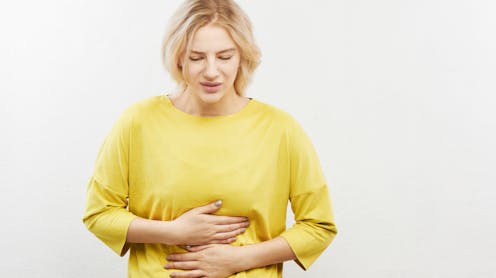Detta inlägg post publicerades ursprungligen på denna sida this site ;
Date:
Author: Dipa Kamdar, Senior Lecturer in Pharmacy Practice, Kingston University
Original article: https://theconversation.com/why-losing-belly-fat-with-pcos-can-be-difficult-and-what-helps-254519

Tried a dozen different ways to shift that stubborn belly and still no luck? You’re not alone. For some women, losing belly fat can be especially difficult – and there may be a medical reason why.
Search the term “PCOS belly” on TikTok and you’ll find a flood of content promising ways to get rid of it. From low to high intensity workouts, eating more protein, apple cider vinegar and natural supplements, the list of so-called solutions is endless. But what actually is a PCOS belly – and are these TikTok tips grounded in science?
Polycystic ovary syndrome (PCOS) is a common hormonal disorder that affects around one in ten women of childbearing age, according to the NHS. However, more than half of these women may show no obvious symptoms.
Women with PCOS produce abnormally high levels of androgens – male hormones like testosterone that are usually present in small amounts. This hormonal imbalance can lead to symptoms such as irregular periods, infertility, acne, excess facial and body hair, and in some cases, multiple cysts on the ovaries.
The exact cause of PCOS is still unknown, but it’s believed to be influenced by both genetic and environmental factors – it often runs in families.
‘PCOS belly’
While not a clinical term, “PCOS belly” is commonly used on social media to describe the accumulation of fat around the abdominal area, which is often seen in women with PCOS. This is frequently linked to insulin resistance, a condition where the body’s cells don’t respond properly to insulin – a hormone that helps regulate blood sugar levels. When insulin isn’t used effectively, excess glucose is stored as fat, particularly around the midsection.
In response, the body may produce even more insulin, which can stimulate the production of testosterone, further exacerbating PCOS symptoms. Women with PCOS often store more visceral fat – the deeper, more dangerous fat that wraps around internal organs – compared to women without the condition. One study found that women with PCOS had significantly more visceral fat, even if their weight was in the normal range. Up to 80% of PCOS cases show evidence of insulin resistance, but not all women have a PCOS belly or are overweight.
Women with PCOS are also more likely to experience chronic low-grade inflammation, which can contribute to weight gain and insulin resistance. Additionally, elevated cortisol levels – the body’s main stress hormone – are often found in PCOS and are linked to abdominal fat.
Some research also suggests that women with PCOS may have imbalanced gut microbiomes, which can lead to bloating and digestive issues. A 2024 study confirmed that women with PCOS are more prone to gastrointestinal problems like irritable bowel syndrome (IBS), with bloating as a key symptom.
Challenging but not impossible
PCOS belly isn’t just a cosmetic concern – it’s associated with higher risks of serious health conditions, including type 2 diabetes, heart diseases and metabolic syndrome (which includes high blood pressure, high cholesterol and elevated blood sugar).
Increased abdominal fat also raises inflammatory markers, worsening insulin resistance and perpetuating a vicious cycle of hormonal imbalance.
And it’s not just physical health. PCOS has a profound effect on mental health, with studies showing higher rates of anxiety, depression, and body image issues among women with the condition.
Losing weight with PCOS is challenging, but not impossible. While you can’t spot-reduce belly fat, losing overall body fat can help shrink your midsection and reduce health risks.
There’s no one-size-fits-all “PCOS diet”, but many women benefit from eating a balanced diet that focuses on whole foods, lean proteins, healthy fats and low-glycaemic index carbs that don’t spike blood sugar.
A balanced diet can also reduce inflammation and help curb cravings between meals. Research shows that walking after meals can help lower blood glucose, making fat storage less likely.
Despite TikTok warnings about cortisol and high-intensity workouts, studies show both Hiit (high-intensity interval training) and Mict (moderate-intensity continuous training) can improve insulin sensitivity and lower testosterone levels in women with PCOS. Exercise can also lift your mood and reduce stress. The NHS recommends 150 minutes of moderate intensity exercise weekly and strengthening activities at least two days a week.
Chronic stress increases cortisol, which can worsen PCOS symptoms. Yoga, meditation and deep breathing can all help. Quality sleep is also crucial, both for hormone regulation and overall weight management. Women with PCOS are more prone to sleep issues like obstructive sleep apnoea.
Some TikTok influencers recommend natural remedies – but always read the label and speak to a healthcare professional before starting taking any herbal medicines or alternative therapies.
Supplements that show some promise include inositol, coenzyme Q10, vitamin D and curcumin. Berberine and L-carnitine may also be helpful. Research suggests these may improve insulin resistance or reduce inflammation, but more high-quality studies are needed to confirm their effectiveness and safety. Doctors may also prescribe metformin, to improve insulin sensitivity, or hormonal contraceptives to regulate periods and hormonal imbalances.
PCOS belly is real, but so are the solutions. Every woman’s experience with PCOS is unique, and what works for one person might not work for another.
Managing PCOS belly requires a holistic approach including diet and nutrition, regular exercise, stress management, sleep hygiene and possibly medication or supplements. If you’re struggling, speak with a GP or registered dietitian and always check with a pharmacist or doctor before starting any new supplements.
You deserve support that’s based on science – not social media trends.
![]()
Dipa Kamdar does not work for, consult, own shares in or receive funding from any company or organisation that would benefit from this article, and has disclosed no relevant affiliations beyond their academic appointment.

